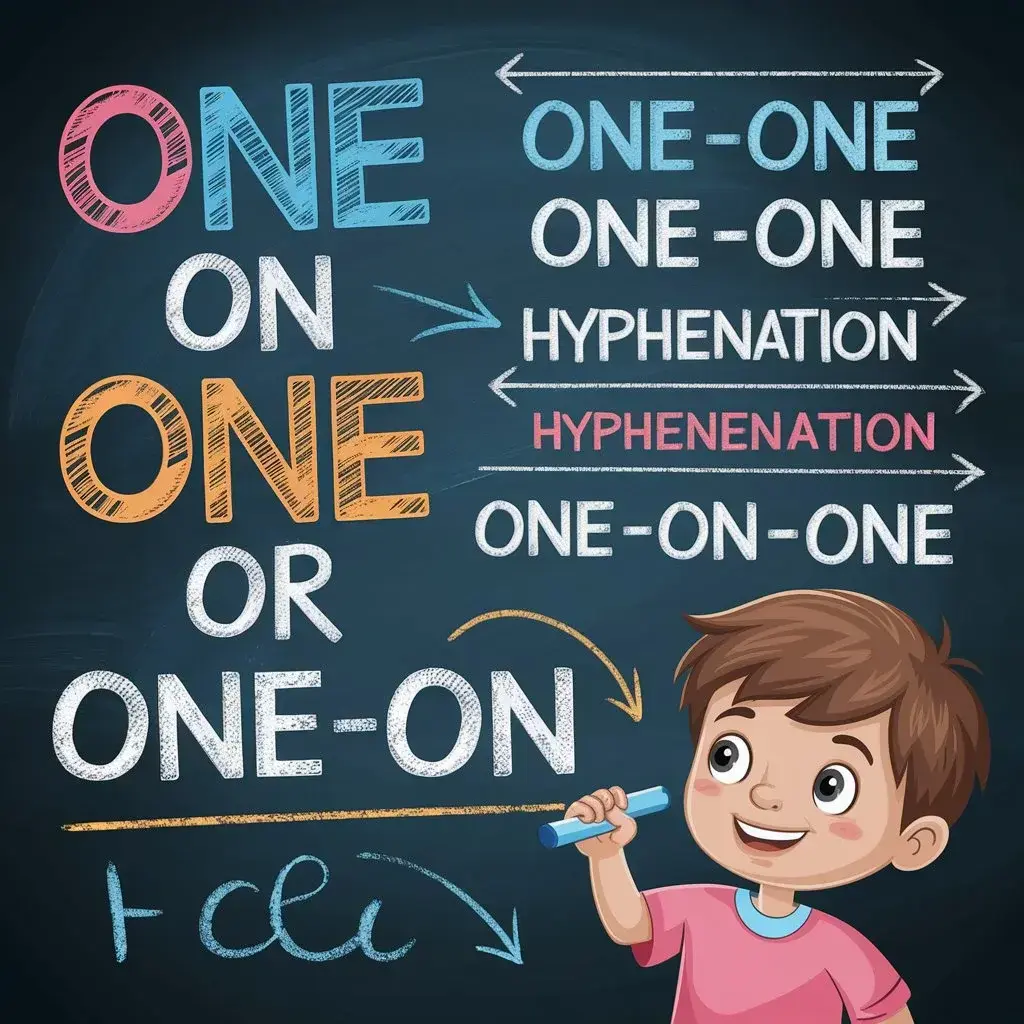Hyphenation rules can be confusing at first if you’re not used to seeing them or working with them. Knowing whether it’s one on one or one-on-one is a good example of English hyphenation, and it’s important to understand when to use hyphens correctly. So, is one on one hyphenated?
One On One or One-On-One – Hyphenated or Not?
You should hyphenate one-on-one when using it as an adjective to modify a noun. You should keep it unhyphenated when it’s used as a phrase noun and isn’t modifying any other nouns in the sentence. It’s more common to see one-on-one written with hyphens. The one-on-one hyphenation rule has very few exceptions where you’d see it without hyphenation.
Examples of When to Use “One On One”
When we compare one on one vs. one-on-one, it helps to look at examples of when each version is appropriate. We’ll start with the less common version, “one on one”—no hyphens here because it’s used as a phrase noun, rather than modifying another noun.
Examples
- We should talk one on one to resolve this issue.
- The coach prefers to work one on one with his players.
- Let’s handle this situation one on one.
- I like to learn better in a one on one setting.
- We need to meet one on one to go over the details.
- They decided to settle their differences one on one.
- Can we discuss this one on one?
- She prefers tutoring one on one rather than in a group.
- The manager is available for a one on one session.
- He wants to challenge me one on one.
- Let’s compete one on one and see who wins.
- I’d like to train with you one on one.
- Why don’t we handle this one on one instead of involving others?
- Can you meet me for a one on one conversation tomorrow?
- He prefers one on one attention when studying.
- We can discuss this further one on one after the meeting.
- The basketball players practiced one on one.
- I think we should go one on one in the final round.
- They worked one on one to solve the problem.
- Let’s face each other one on one without any distractions.
- She wants to speak one on one with her professor.
- The students were paired one on one for the activity.
- You can address your concerns one on one with the principal.
- They played the game one on one to see who was better.
- Let’s schedule a one on one call next week.
- We have a one on one scheduled for tomorrow.
- The best way to learn this skill is one on one.
- I’d like to review your progress one on one.
- Can we handle this one on one rather than in a group?
- I prefer working one on one with a mentor for better guidance.
Examples of When to Use “One-On-One”
Now, let’s explore the more common version: “one-on-one” with hyphens. We use “one-on-one” to group the words together and show that they are modifying a noun or another word in the sentence. This is similar to other hyphenated words in English, where the hyphen helps to make the relationship between words clearer.
Examples
- We’ll have a one-on-one meeting tomorrow.
- He offered me a one-on-one training session.
- The one-on-one consultation was very helpful.
- They had a one-on-one conversation about the project.
- I scheduled a one-on-one with my mentor.
- The one-on-one match ended in a tie.
- She prefers one-on-one coaching over group sessions.
- The teacher gave him one-on-one attention in class.
- A one-on-one interview is scheduled for the candidate.
- The one-on-one game between them was intense.
- He requested a one-on-one evaluation to get personalized feedback.
- The one-on-one meeting was rescheduled for next week.
- We had a one-on-one discussion about my performance.
- The one-on-one lesson was more effective than group learning.
- I prefer one-on-one interactions in small groups.
- The one-on-one session with the therapist was insightful.
- He won the one-on-one basketball game.
- A one-on-one tutorial is available for students needing extra help.
- The one-on-one debate was heated and informative.
- She excels in one-on-one competitions.
- I need a one-on-one meeting with my supervisor to clarify things.
- The one-on-one mentorship program helped him grow.
- She arranged a one-on-one with her boss to discuss career goals.
- The one-on-one consultation improved my understanding of the topic.
- I’ve scheduled a one-on-one demo to showcase the product.
- His one-on-one performance review went smoothly.
- They had a one-on-one sparring session at the gym.
- The one-on-one guidance from the coach improved his skills.
- We’ll solve this issue in a one-on-one format.
- She arranged a one-on-one strategy session for the project.
Is One On One Hyphenated in AP Style?
According to AP style rules, hyphens act as connectors for groups of words that work together to make an obvious connection for the reader. We use hyphenated words that are closely linked to modify nouns or objects, clarifying the meaning. In this case, the words “one,” “on,” and “one” are linked to form a clear description of the type of meeting, game, or interaction.
Examples
- The one-on-one meeting went well.
- We arranged a one-on-one interview with the candidate.
- The one-on-one discussion helped clear things up.
- She had a one-on-one session with her tutor.
- The one-on-one match was intense from start to finish.
- He requested a one-on-one evaluation for personalized feedback.
- I scheduled a one-on-one with my manager to review the report.
- The one-on-one coaching improved her skills dramatically.
- We’ll handle this through a one-on-one consultation.
- A one-on-one debate took place between the candidates.
Should I Capitalize “On-One” in the Word “One-On-One”?
In titles, the capitalization rules for hyphenated words can be tricky, but it’s mostly about personal preference. Some people only capitalize the first word or proper nouns, so in this case, “on-one” would remain lowercase. Others prefer to capitalize all important words except short conjunctions, prepositions, and articles. Here, only the first “one” would be capitalized. Finally, you can choose to capitalize every word, making all three parts of “one-on-one” capitalized.
Alternatives to “One On One”
Here are a few alternatives for one-on-one in case you’re unsure about the hyphenation rule. Most of these alternatives are also hyphenated, so learning the rules of hyphenation can be helpful in understanding similar constructions.
- head-to-head
- face-to-face
- head-on
- personal
- intimate
Quiz – One On One or One-On-One?
Let’s see what you’ve learned with a quick quiz! Choose between the hyphenated and unhyphenated versions for each sentence. Answers are provided at the end, so you can check your work!
- This is a (A. one on one / B. one-on-one) meeting.
- We shouldn’t see each other (A. one on one / B. one-on-one).
- Why can’t we have a fair (A. one on one / B. one-on-one) game?
- You like to see me (A. one on one / B. one-on-one).
- Let’s have a (A. one on one / B. one-on-one) discussion about your future.
Quiz Answers
- B
- A
- B
- A
- B
FAQs
What is the difference between “one on one” and “one-on-one”?
The phrase “one on one” is used when it’s a noun phrase and doesn’t modify another word. “One-on-one,” with hyphens, is used as an adjective to describe something, like a meeting or game. It’s more common to see the hyphenated form.
When should I hyphenate “one-on-one”?
You should use the hyphenated form, “one-on-one,” when it’s describing something, like a one-on-one discussion or a one-on-one game. The hyphen helps link the words together to show they are describing a specific type of interaction.
Is “one-on-one” more common than “one on one”?
Yes, the hyphenated form “one-on-one” is more commonly used. It is especially common when you are describing things like meetings, competitions, or personal discussions. “One on one” is less common and usually appears as a noun phrase.
Can I use “one on one” without hyphens?
Yes, you can use “one on one” without hyphens when it’s a noun phrase, not modifying anything else. For example, you could say, “We will talk one on one.” The words are not linked to describe another noun.
How does AP style suggest hyphenating “one-on-one”?
In AP style, hyphens are used to connect words that work together to describe something else. So, “one-on-one” is hyphenated when it’s used as an adjective. It makes the meaning clearer to the reader by showing the words work as a unit.
Should “on-one” be capitalized in titles?
It depends on the style guide or your personal choice. Some people only capitalize the first word, so “on-one” would stay lowercase. Others prefer to capitalize all major words except small prepositions and articles.
Are there other phrases similar to “one-on-one”?
Yes, there are similar phrases like “head-to-head,” “face-to-face,” and “head-on.” These are also hyphenated and describe similar types of interactions, often in a competitive or personal setting.
Why are hyphens important in “one-on-one”?
Hyphens help to clarify the meaning of words that work together to describe something. In “one-on-one,” the hyphen shows that the words belong together, making it clear you are talking about a specific type of meeting or interaction.
Conclusion
In conclusion, understanding when to use “one on one” vs. “one-on-one” can greatly improve your writing clarity. The hyphenated form is more common and should be used when modifying nouns, like in one-on-one meetings or one-on-one games. The unhyphenated form works when the phrase stands alone as a noun. By following these simple rules, you’ll use hyphens effectively and make your sentences clearer for readers.

I’m Clara Whitmore, the girl running the show at “Grammer Grove.” I’ve been playing with expressions and formats to make grammer a whole lot of fun. Over at Grammer grove, we’re here to make your English grammer incredible. Let’s add some professionalism and gratitude to yourwritting together!












